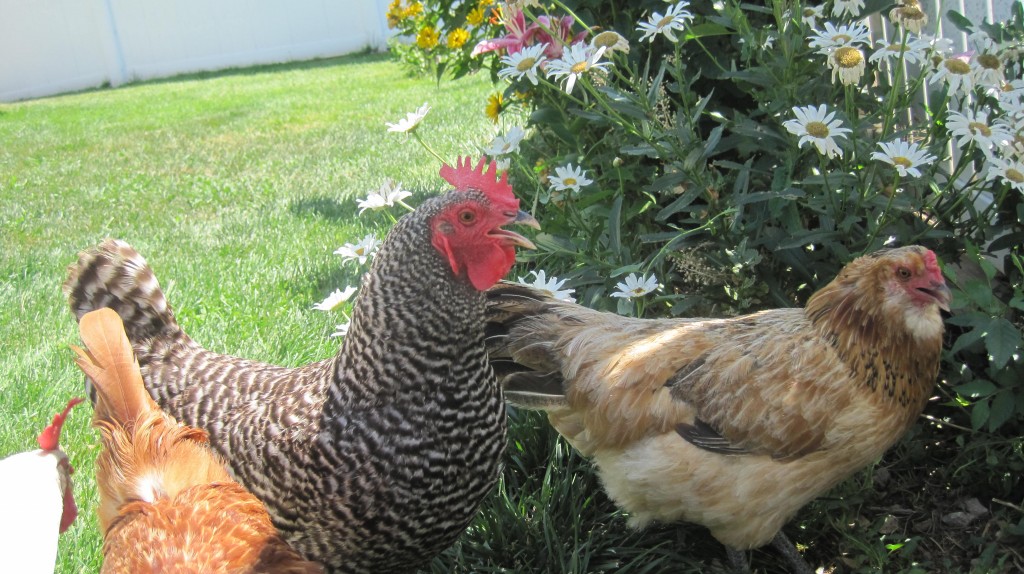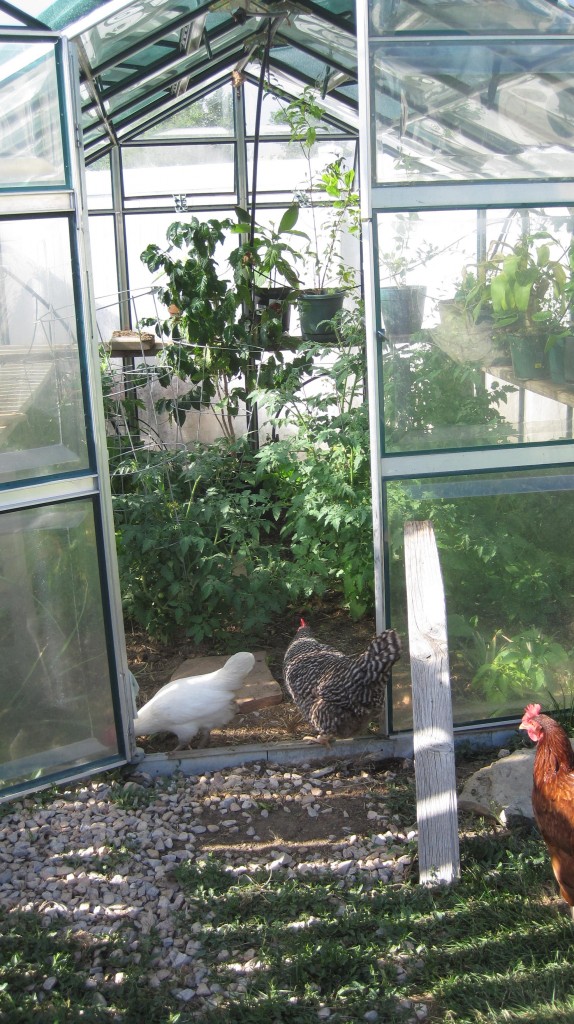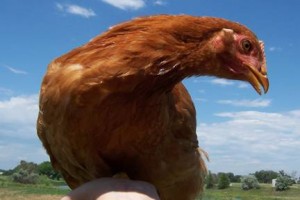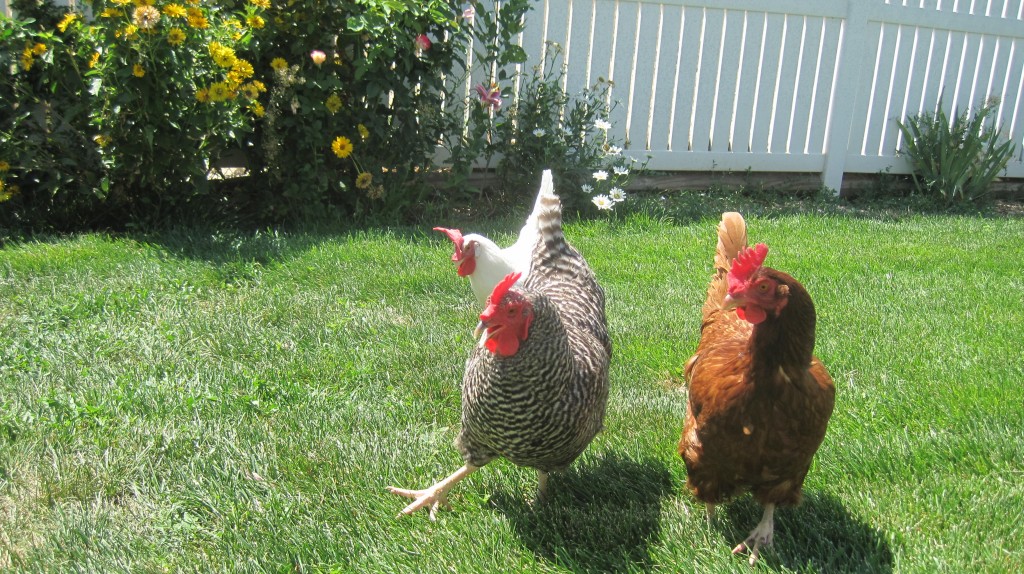There are a lot of misconceptions out there about raising chicken hens in your backyard whether in the city or country, so we’ve set out to provide you with some FACTS and answer some FAQs (Frequently Asked Questions).
Common Myths and the Reality of Chicken Hens
Myth # 1) They are noisy. (Q: Are chickens noisy?)
Reality: Chicken hens are one of the quietest domestic animals. They cluck softly from time to time, and will often cluck to let you know they recently laid an egg. Unless they are in danger, they do not squawk. They sleep at night just as people do and are completely quiet from dusk to dawn. They are quiet because they want to be left alone to hunt and peck and do not want to attract attention to themselves. Roosters, on the other hand, can be quite noisy as this is their role in the flock.
Myth # 2) They are dirty. (Q: Are chickens dirty or smelly?)
Reality: Chickens are very clean animals. They will occasionally give themselves “dirt baths” but this is actually in order for them to preen their feathers and keep themselves clean and cool. Their droppings usually do not smell, especially if they are allowed to range freely in a grassy yard and are not caged or confined in a small area. The droppings are easily hosed off and break down into an excellent fertilizer for the lawn. Just like all pets and animals, chickens need responsible owners to keep the area tidy and clean out the living area from time to time.

Chickens are a beautiful and fun part of the backyard
Myth # 3) They are “3rd World creatures”. (Q: Aren’t chickens “3rd World creatures”?)
Reality: Chickens have been given a bad rap. Because they are so low maintenance and cost so little to raise, many people view them as a social status symbol of the uncivilized or uncultured class. This is completely an image issue. Some areas of the world have problems with stray dogs. This is not because dogs are inherently “3rd World creatures”, but rather because the animal control laws of those countries are not adequate. As long as chickens are raised responsibly and the owners adhere to all the other existing animal control codes including keeping them fenced in, they are perfectly fine pets in our area. Many areas in the US with high incomes and high standards of living have very chicken friendly codes including Madison, WI, Portland OR, Loveland, Fort Collins, and Longmont, CO among many others.
Myth # 4) They carry disease. (Q: Do chickens carry disease?)
Reality: Chickens are just like any other animal including humans, dogs, cats and others when it comes to disease. They are not any more likely to carry disease than a dog. If they are well-cared for, fed, watered and kept in a clean environment, then they are more likely to stay healthy. Diseases are much more likely to be harbored in confined animal feeding operations due to their sheer size and tight conditions than in a healthy backyard setting.
Myth # 5) They attract pests. (Q: Do chickens attract pests?)
Reality: To the contrary, chickens love to eat insects of all kinds including worms, beetles, grasshoppers, earwigs, mosquitoes and their larvae, fly larvae, ticks and more and are one of the best methods of insect control. Chickens have even been known from time to time to eat small mice (you should watch the incredible video of our chickens as they attack and eat a mouse our cat caught)! As long as their feed is properly stored just as dog or cat food should be, it will not attract added pests either.
Myth # 6) They attract predators. (Q: Do chickens attract predators?)
Reality: It is true that predators such as foxes, skunks, racoons and hawks often eat chickens if they can catch them. However, these same predators might eat cats, rabbits and even small dogs if given the opportunity. Chickens do not attract predators any more than these other animals. They have instinctual defenses that protect them from these predators, such as sleeping in a protected area (coop) at night and making very little noise. Most family dogs and cats generally leave chickens alone and throughout the ages have all lived together in harmony.
Myth # 7) They need a lot of space. (Q: How much space do chickens need?)
Reality: Free range chickens need very little space. Most poultry associations designate that chickens need about 3 square feet of ranging area. Of course they will do even better with more, but an average-sized backyard would easily accommodate 4-6 chickens -no problem. Chickens are completely content to peck around in a fenced yard and have no reason to flap over fences, especially if they are not able to look through those fences at scrumptious bugs on the other side (privacy fencing works best). A small coop to sleep in at night is required. This can be very small if it is only used for sleeping. A coop that is 3x3x3 feet for about 4 chickens would be perfect if they are allowed to roam feely during the day. A coop of this size is about the same size as an average dog house.

Chickens are a great addition to any home garden
Myth #8) They require a lot of equipment, work, or time. (Q: Does it take a lot of work to raise chickens?)
Reality: Chickens are very low maintenance. They simply need water, food and shelter. They do not need to be groomed, washed, pet, walked, spayed, neutered, or trained. You can spend as little or as much time with them as you want. Their bedding area should be cleaned out about once a month which is not much of a problem.
Myth #9) Chickens are dangerous to have around children. (Q: Are they dangerous?)
Reality: While chickens are thought to have evolved from the Tyrannosaurus Rex, chickens are definitely not dangerous. Most chickens have no interest in humans unless they are feeding them. They have no teeth and could not hurt a child as a dog or cat might.
Myth #10) You need a rooster in order to have eggs. (Q: Don’t you need a rooster?!)
Reality: Roosters are unnecessary in the laying process and, in fact, are unnecessary to raising chickens. Chicken hens will lay eggs with or without a rooster. The only difference is that with a rooster, the eggs may be fertilized. Without a rooster they are not.
Are you interested in raising chickens in Greeley, Colorado and want to know if you can? Yes, you can, and here’s what the Greeley Chicken ordinances really say.
Sources Consulted for pages in this series:
Information on this site was sourced from the Fort Collins Urban Hens Coalition, Larimer County Humane Society, J +T Country Feed, the CSU Extension Office in Greeley, the local USDA office, The Weld County Fair, the sites and books listed below and from experiential reports.
Websites
NY Times article about backyard hens
Books
In Defense of Food: An Eater’s Manifesto Michael Pollan
The Omnivore’s Dilema by Michael Pollan
Real Food: What to Eat and Why Nina Plank
Real Food Revival Sherri Brooks Vinton and Ann Clark Espuelas
Keeping Chickens: The Essential Guide Jeremy Hobson and Celia Lewis
Living with Chickens: Everything You Need to Know to Raise Your Own Backyard FlockJay Rossier, Geoff Hansen, and American Poultry Association



I sent a message sometime ago to see if you are still pursuing changing the City of Greeley ordinance to allow raising chickens. I am considering beginning petitions and city council requests the change the ordinance. Are you still working on this? If so, can I help in this matter? If not, do you mind if I link a new web page to your site?
Do you have any suggestions on how best to approach this with the city?
Thank you for your reply.
I seem to be getting mixed info re: chickens in greeley. Our home is on a .25 acre. I’ve read where we can have 1 hen per 10th acre and other places that say no. help!
Geri,
We are not currently pursuing changing the code because we are in the process of moving. However, I would be happy to help from afar and feel free to link to us! I have worked on social policy both personally and professionally and could definitely give you some pointers.
Stacy,
There are a variety of rules in Greeley which is why it is so confusing. If one goes by the “pet” rule, there is no limit to the number of pets one can have in Greeley. If you go by the livestock rule, it depends on how your house is zoned. In ag holdings it could be 2 per 1/10 of an acre. If it is unincorporated, it could be county rules and not even apply. In most cases, though, it is 1 per 1/10. So for .25 you should be able to have 2. If they want to get picky on you, they would say that the full .25 has to be available to the chickens (which probably includes your house and your front lawn), but I doubt that they would make you do that as it is better to have them in the back and out of sight of neighbors. Go for it!
The city has told me that they are not looking to ticket people over chickens. They will only investigate if they get a complaint, and that is very unlikely. If you have privacy fencing no one will even know that 2 or 3 chickens are back there. And after all, what’s the worst that could happen? They give you a warning. We got one. We fought it and we still have our chickens. Not a big deal, and part of the fun. Hope this helps!
Thanks…I think we will definitely go for it. 🙂 I don’t think the neighbors will mind;they raise bees. i am looking at the plymouth rock breed. From what I have they are good egg layers and and a docile breed.
Doe anyone know if it is legal to own backyard chickens in Dickinson or League City? how much space do you need?